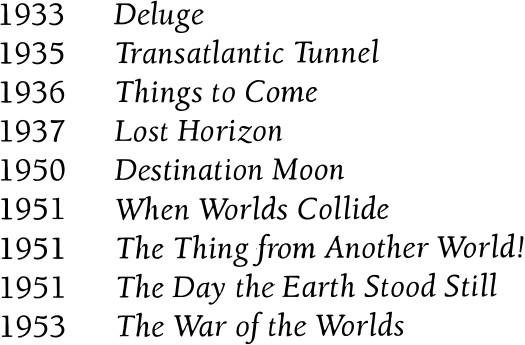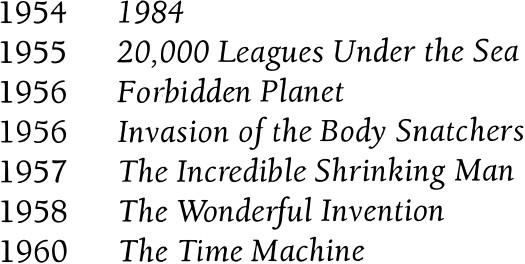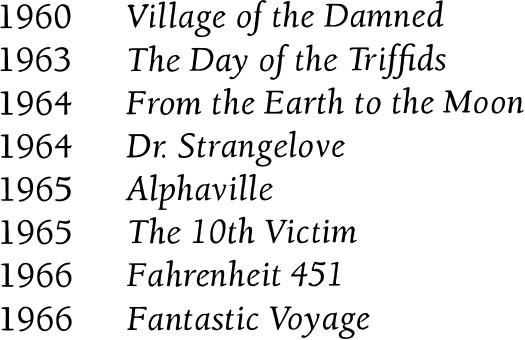Star Wars on Trial (26 page)
Read Star Wars on Trial Online
Authors: David Brin,Matthew Woodring Stover,Keith R. A. Decandido,Tanya Huff,Kristine Kathryn Rusch




MATTHEW WOODRING STOVER: What year was that boring piece of crap-sorry, cinematic masterpiece (if you're really, really high)2001: A Space Odyssey released? 1968, wasn't it? So it had almost a decade to inspire filmmakers before Star Wars made its debut ... and yet, mostly it inspired clouds of suspiciously scented smoke at midnight showings. Could it be that the real problem has been failure of the "serious" science fiction types you pine for to produce something entertaining enough to capture the popular imagination? Or do you consider the real problem to be that the public's just too stupid to appreciate what you consider the Good Stuff?
LOU ANDERS: Neither. The public has no problem with distinguishing the good stuff, hence the widespread acknowledgement of the first Matrix, and the failure of the third. Or the success of The Lord of the Rings. Furthermore, quite a few critics at the time praised Jackson for providing the first trilogy that didn't disappoint as it played out, with frequent negative comparisons to The Phantom Menace and Attack of the Clones. Oddly, though, the new Star Wars trilogy reverses the trajectory of the typical trilogy in that Lucas did provide a strong finish after two unwatchable movies. If one were to line up the six Star Wars films in their numeric order, you would get an interesting bell curve. Of course, The Ewok Adventure and The Star Wars Holiday Special somewhat distort the symmetry.
Also, 2001 was nominated for Academy Awards in the categories of Best Director and Best Writing, Story and Screenplay. How many science fiction films are given that respect these days?
MATTHEW WOODRING STOVER: I see you quote Mike Resnick saying that novelizations teach writers to be lazy; does Mr. Resnick characterize James Blish (author of more than ten volumes of Star Trek episode tie-ins) as a lazy writer? Do you? How about Joe Haldeman, author of the Trek tie-in World Without End? How about Greg Bear (author of Star Wars: Rogue Planet)? Sean Stewart (author of Star Wars: Dark Rendezvous)? How many more top-rate authors would you like to have the opportunity to personally insult?
LOU ANDERS: Just one.
MATTHEW WOODRING STOVER: Let me direct your attention to this statement of yours: "By contrast, when you read a novelization, not only are you getting exactly what you are expecting, you are almost certainly not getting a writer's best work." First, as any self-respecting Star Wars fan will tell you, you're just flat damned wrong on the first point; any reader of the New Jedi Order will have at least three novels in that list (one of them, most likely, Traitor, by Your Humble Counsel for the Defense) that he will tell you contained elements that shocked, dismayed, surprised and/or stunned him. On the second point, well-you're not a novelist. Let me put it this way: if you were a writer whose books sell, say, thirty-odd thousand copies, and you had a chance to write a novel that you knew, from the start, would sell a minimum of half a million copies, and would introduce you and your writing-and your concern with serious fiction-to millions of fans (because those books get passed from hand to hand as well), would you piss on the chance and hold back your best work?
LOU ANDERS: You are correct; I am not a novelist. What I am is an editor. And speaking in my capacity as an editor, who reads and evaluates hundreds of manuscripts a year, if the Star Wars novelization I read in preparation for this anthology is indicative of the respective author's "best work," I would hate to read his own original material. I gave up on page 188, having endured the shameless padding and horrendous transgressions of the most basic rule of writing-"show, don't tell"-far longer that I would normally tolerate, for the purposes of this essay. Furthermore, I am also a consumer, who has as much right to vote with his dollar as anyone else, and more of my own hard-earned cash won't be going to LucasBooks anytime soon. But that's just me. Have a happy Life Day!
MATTHEW WOODRING STOVER: Shameless padding? "Show, don't tell"? Is that all you've got? No wonder you're an editor instead of a writer. That's the most pathetic excuse for a personal insult I've ever heard. I get better than that from the semi-literate wannabes on the Web.
"Stover makes Dan Brown look like Tolstoy."
"Heroes Die is the kind of book a demented third-grader might finger paint in his own vomit."
"The only way Blade of Tyshalle could be any worse is if it had been edited by that pseudo-intellectual human pimple from Pyr."
As trash-talk goes, Mr. Hundreds-of-Manuscripts-per-Year, yours barely makes it to the level of a stuck-out tongue.
(Reaction in the courtroom)
DROID JUDGE: Order! Order! Mr. Stover, you are out of line!
MATTHEW WOODRING STOVER: What else is new?
DROID JUDGE: Do you have an actual question?
MATTHEW WOODRING STOVER: No, Your Honor. I'm finished with this son-of-a-ah, witness.
DROID JUDGE: Mr. Stover, you are to treat all witnesses with respect. Please don't make me warn you again. You may now call the Defense witness.
MATTHEW WOODRING STOVER: Actually, I have three witnesses on this charge.
DROID JUDGE: (severely) You know only one witness per charge is allowed.
MATTHEW WOODRING STOVER: I ask the Court's indulgence in this case. There are multiple charges here: that Star Wars is unfairly crowding out other books, that Star Wars novels are not as good as original novels, etc. I'd like the freedom to address these charges.
DAVID BRIN: If I may, Your Honor. Each of us needs to give a little. After all, the topic is popular culture. Mr. Stover has permitted me a bit of speechifying, during cross-examination. In return, I've been relaxed about his-colorful language. We can give way on this point, as well.
DROID JUDGE: Very well, Mr. Stover, I'll indulge this. Please call your witnesses.
MATTHEW WOODRING STOVER: My first witness is fantasy writer Laura Resnick, who will discuss the realities of the bookstore shelves. My second witness is novelist and Star Wars writer Karen Traviss, who will discuss the literary merits of Star Wars novels. My third witness is Kristine Kathryn Rusch, a science fiction and fantasy writer who will explain why Star Wars is just what the genre needs.





 EVERAL YEARS AGO, a heated debate raged in the Science Fiction and Fantasy Writers of America (SFWA), a respected national organization, about whether or not work-for-hire novels should be eligible for the Nebula, the prestigious annual literary award voted on and presented by the SFWA. Some members argued that such books were as well written and worthy of recognition as any other kind of novel; other members argued that the very nature of work-for-hire should exclude it from Nebula consideration. And in a particularly memorable written statement, one prominent SFWA member dismissed work-for-hire novels as something that any braindead chimpanzee could write. In other words, work-for-hire books emerged as a controversial issue among science fiction and fantasy writers, one that provoked fiery arguments and open insults in a professional forum.
EVERAL YEARS AGO, a heated debate raged in the Science Fiction and Fantasy Writers of America (SFWA), a respected national organization, about whether or not work-for-hire novels should be eligible for the Nebula, the prestigious annual literary award voted on and presented by the SFWA. Some members argued that such books were as well written and worthy of recognition as any other kind of novel; other members argued that the very nature of work-for-hire should exclude it from Nebula consideration. And in a particularly memorable written statement, one prominent SFWA member dismissed work-for-hire novels as something that any braindead chimpanzee could write. In other words, work-for-hire books emerged as a controversial issue among science fiction and fantasy writers, one that provoked fiery arguments and open insults in a professional forum.